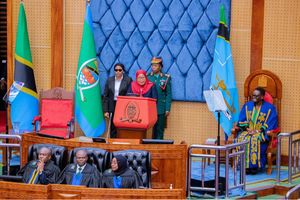Researcher rebuked for genetically editing babies

Researcher He Jiankui speaks at a scientific forum. PHOTO|AFP
What you need to know:
He Jiankui made the stunning revelation that a mother had given birth to Lulu and Nana, twin girls whose genes had been edited
Leading genomic scientists from around the world called for an immediate halt to any clinical use of gene-editing in human embryos and sharply reprimanded a Chinese researcher who conducted a secretive experiment that he says produced the world’s first genetically edited babies.
The statement came at the conclusion of the Second International Summit on Human Genome Editing in Hong Kong. Later, the Chinese government said it had suspended and launched a probe into the clinical project run by researcher He Jiankui in southern China.
The twin announcements from the leading scientific body and Chinese authorities capped a dramatic week for the genomics world. He made the stunning revelation that a mother had given birth to Lulu and Nana, twin girls whose genes had been edited to make them resistant to HIV.
Hours after the summit closed Thursday, a high-ranking Chinese official told a state broadcaster that He’s project has been suspended amid a government investigation. He did not indicate whether He was charged with any crimes.
“It’s flagrantly violated our national regulations, and flagrantly broken the scientific world’s ethical bottom line,” Xu Nanping, vice minister of science and technology, told CCTV in an interview. “It’s shocking, unacceptable, and we firmly oppose it.”
The summit organizers were similarly critical in a highly anticipated consensus statement issued on the event’s last day.
“At this summit we heard an unexpected and deeply disturbing claim that human embryos had been edited and implanted, resulting in a pregnancy and the birth of twins,” said the summit’s organizing committee, which called for independent verification of He’s claims that have so far not been published in a peer-reviewed journal.
“Even if the modifications are verified, the procedure was irresponsible and failed to conform with international norms,” the organizers said in the summit’s consensus statement that is usually seen as setting the tone and direction for the fast-changing field.
The committee, representing leading researchers from the United States, Britain and Hong Kong, did not call for an outright ban on gene editing.
Instead, it acknowledged that the field was moving toward a future where the procedures would be widely researched in clinical trials, and that researchers needed a rigorous framework to set ethical standards and guidelines. But in the meantime, the panel called for a halt.
“The organizing committee concludes that the scientific understanding and technical requirements for clinical practice remain too uncertain and the risks too great to permit clinical trials of germ line editing at this time,” the closing statement said.
He’s work was widely criticized last week by peer researchers and ethicists as a rogue demonstration of a gene editing tool called CRISPR-Cas9, which has opened up a world of new possibilities in biomedical research in recent years. Proponents foresee a time when lethal genetic diseases with no treatments could be eradicated, while critics fear that the technology might be used for casual genetic enhancements, to tweak traits like intelligence or height.
But until this week, such debates were largely theoretical, because no one was known to have established a pregnancy from a genetically-edited human embryo. He’s claimed experiment was a rude awakening for scientists at the summit, and an urgent reminder that discussions about how to responsibly use a technology that could reshape the health and character of future generations might not be enough.
“The need for development of binding international consensus on setting limits for this kind of research . . . has never been more apparent. Without such limits, the world will face the serious risk of a deluge of similarly ill-considered and unethical projects,” Francis Collins, director of the National Institutes of Health, said in a statement. “Should such epic scientific misadventures proceed, a technology with enormous promise for prevention and treatment of disease will be overshadowed by justifiable public outrage, fear, and disgust.” Many countries outlaw such experiments, and in the United States, using genetically altered human embryos for reproductive purposes is effectively banned by law.
After word first leaked of He’s project through news reports, scientists criticized the effort as irresponsible and premature. Investigations were opened into He’s work by China’s Southern University of Science and Technology. (The Washington Post)




